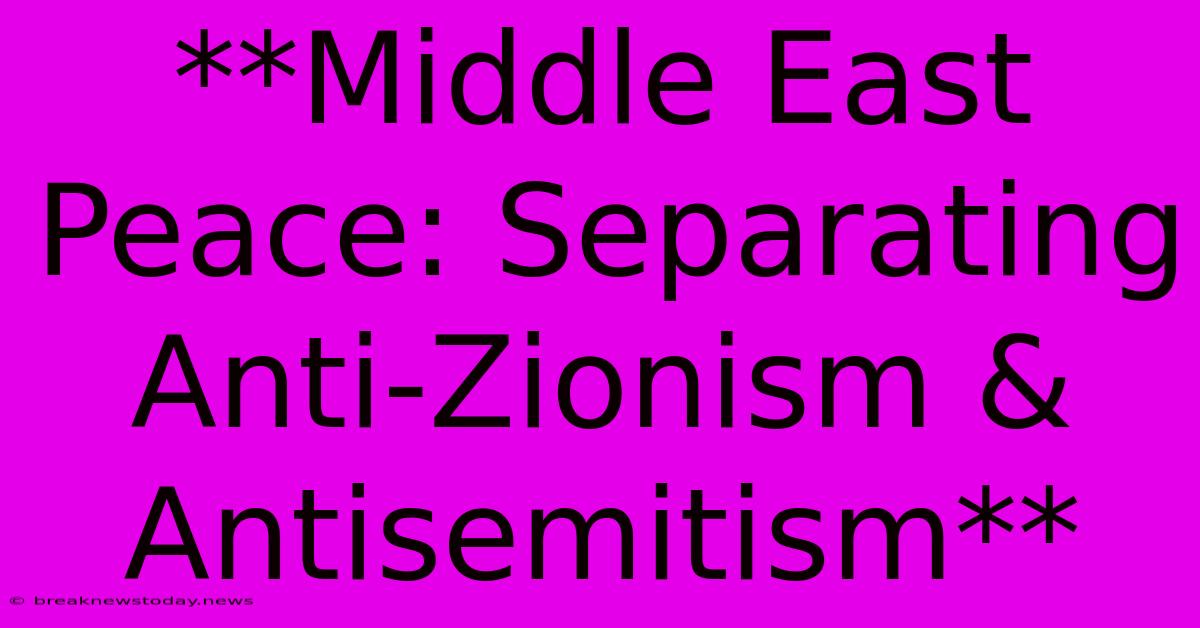**Middle East Peace: Separating Anti-Zionism & Antisemitism**

Discover more detailed and exciting information on our website. Click the link below to start your adventure: Visit Best Website naughtynakes.com. Don't miss out!
Table of Contents
Middle East Peace: Separating Anti-Zionism & Antisemitism
The Israeli-Palestinian conflict is one of the most complex and contentious issues in the world. It's often fueled by deeply held beliefs and emotions, making it difficult to have a nuanced discussion. One crucial aspect of this debate is the distinction between anti-Zionism and antisemitism. While these terms are often used interchangeably, understanding their distinct meanings is essential for productive dialogue and achieving peace.
What is Anti-Zionism?
Anti-Zionism refers to opposition to the existence of the State of Israel. It often stems from the belief that the creation of Israel was an act of injustice against Palestinians, displacing them from their homeland. Anti-Zionists argue that Israel's policies, particularly towards Palestinians, are oppressive and morally wrong. They may call for the dismantling of Israel, a one-state solution, or a complete withdrawal of Israel from occupied territories.
What is Antisemitism?
Antisemitism, on the other hand, is hatred or discrimination against Jews based on their religion or ethnicity. It manifests in various forms, including prejudice, hostility, and violence. Antisemitism has a long and tragic history, dating back centuries, and continues to be a serious problem in many parts of the world.
The Distinction: A Crucial Point
While both anti-Zionism and antisemitism can be harmful, it's crucial to recognize their distinct natures. Anti-Zionism can be a legitimate political position based on concerns about Palestinian rights and Israeli policies. However, when it blurs the line with antisemitism, it becomes dangerous and problematic.
Examples of Antisemitic Disguised as Anti-Zionism:
- Dehumanizing rhetoric: Comparing Israel to Nazi Germany, accusing Jews of controlling the world, or promoting conspiracy theories about Jewish influence.
- Double standards: Holding Israel to standards not applied to other countries, ignoring Palestinian violence, or demonizing Israel for defending itself.
- Denying the Jewish right to self-determination: Arguing that Jews have no right to a state, regardless of their historical claims or the reality of their persecution.
The Importance of Clarity
Clearly differentiating between anti-Zionism and antisemitism is essential for:
- Promoting understanding and dialogue: By recognizing the distinct meanings of these terms, we can foster a more nuanced and constructive discussion about the Israeli-Palestinian conflict.
- Combating antisemitism: Identifying and condemning antisemitic rhetoric and behavior is crucial for creating a safer and more inclusive world.
- Achieving peace: Focusing on the real issues of the conflict, such as Palestinian rights and Israeli security, is crucial for finding a lasting solution.
Moving Forward
The Middle East peace process requires honest and respectful dialogue. Understanding the nuances of anti-Zionism and antisemitism is crucial for creating a space where genuine dialogue and reconciliation can take place. While acknowledging the complexities of the conflict, it's vital to recognize the inherent danger of conflating legitimate criticism of Israeli policies with the age-old hatred of Jews. Only then can we move towards a future of peace and coexistence for all.

Thank you for visiting our website wich cover about **Middle East Peace: Separating Anti-Zionism & Antisemitism**. We hope the information provided has been useful to you. Feel free to contact us if you have any questions or need further assistance. See you next time and dont miss to bookmark.
Featured Posts
-
Jdt Strong Performance Terengganu Wins
Nov 02, 2024
-
Ny Musikk Fra Snoop Dogg Sval And The Cure
Nov 02, 2024
-
Zukunft Der Kudelski Aktie Unklarheiten
Nov 02, 2024
-
Luzon 4 9 Magnitude Na Lindol
Nov 02, 2024
-
Al Nassr Empata Ronaldo En Polemica
Nov 02, 2024
